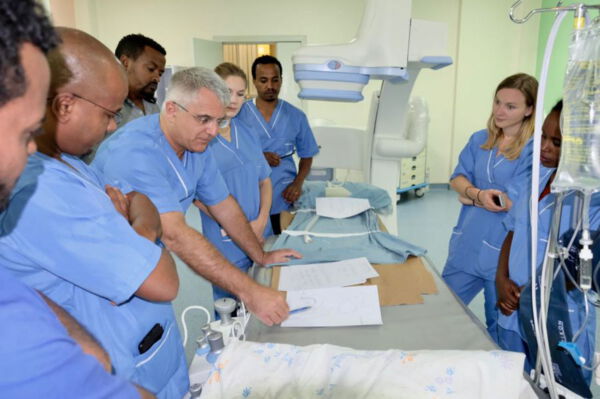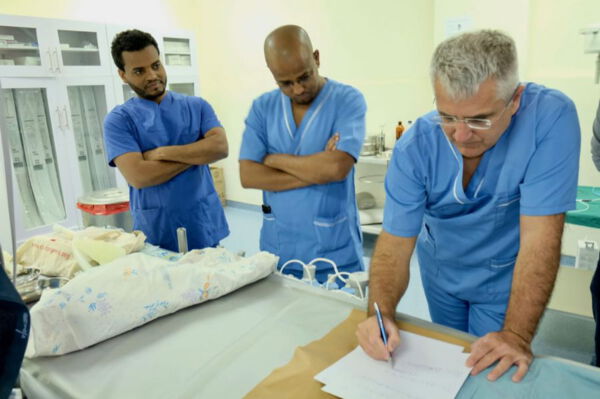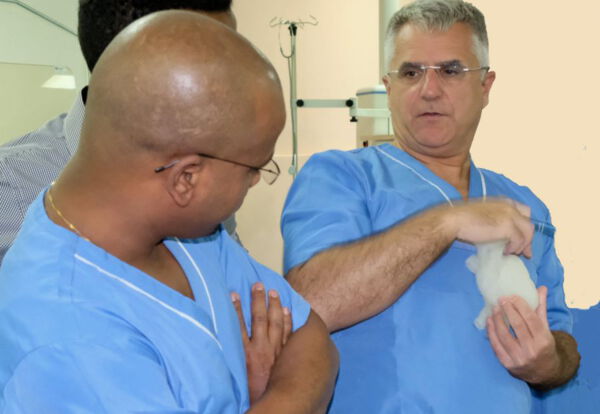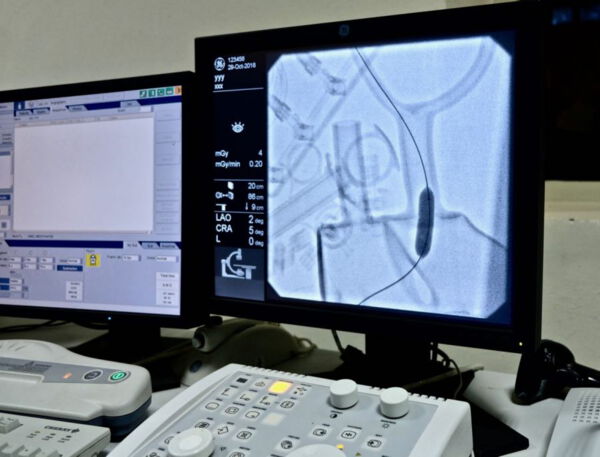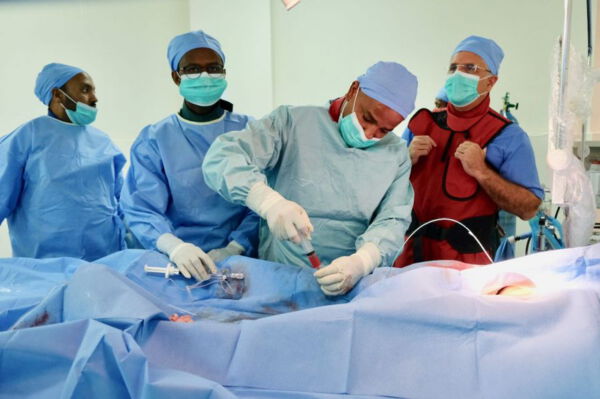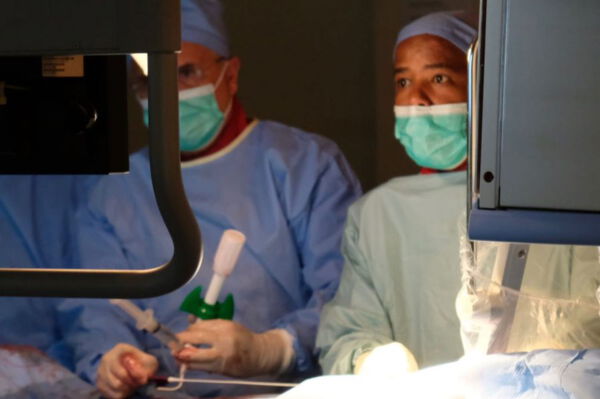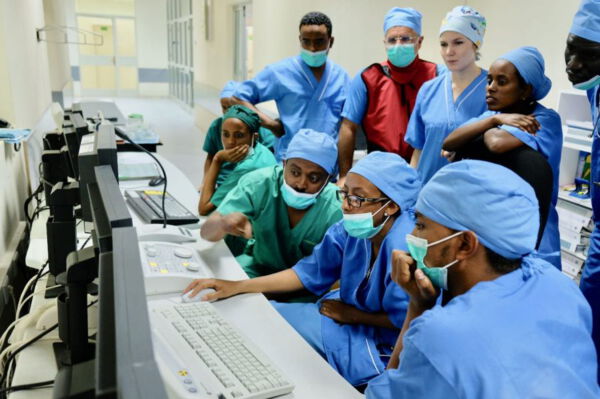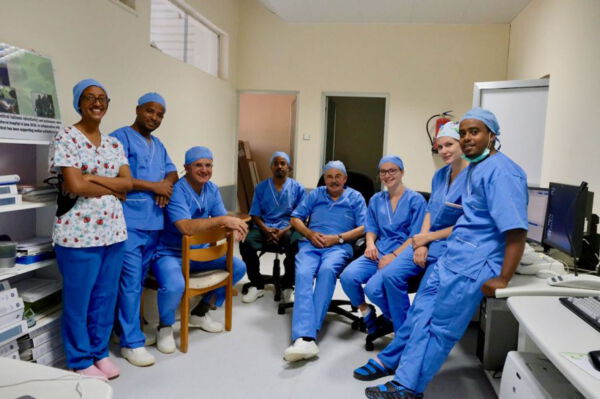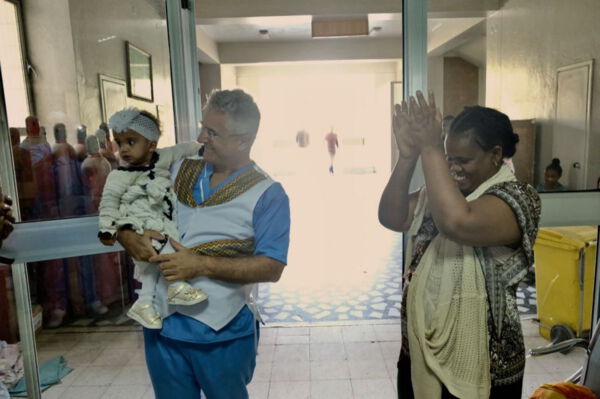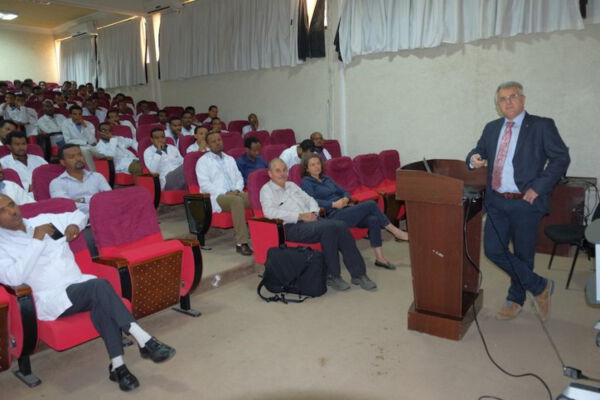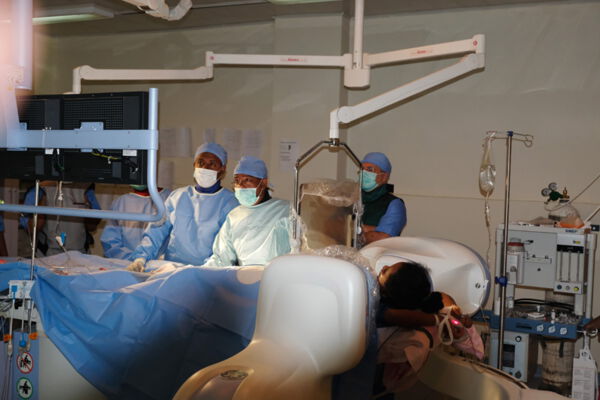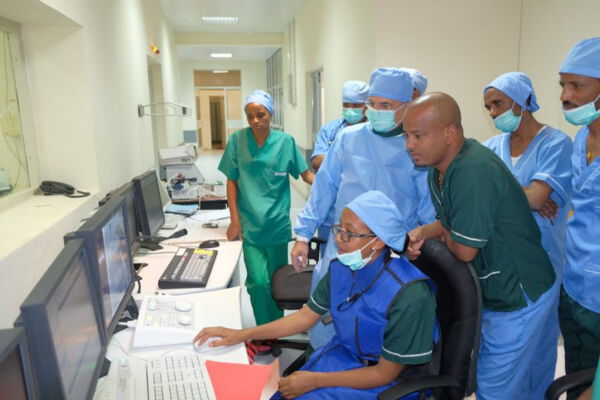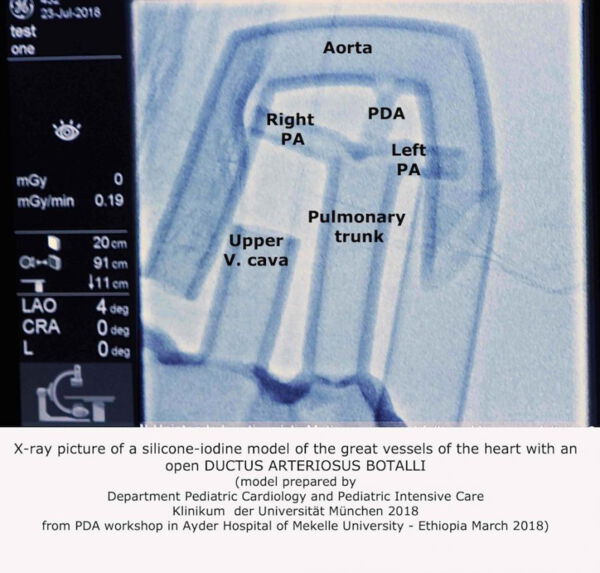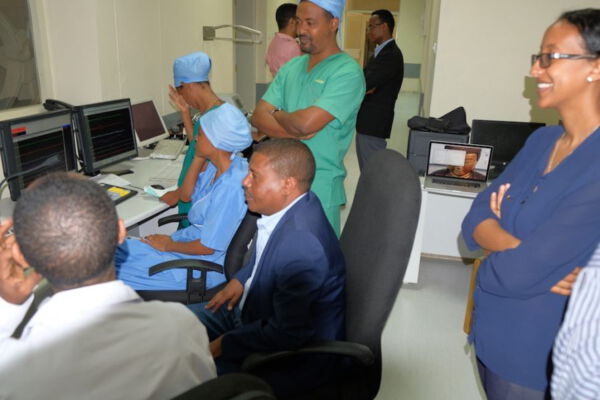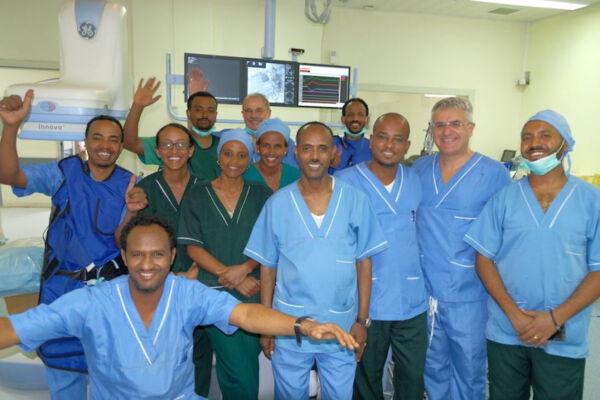The Cath Lab of Ayder Referral Hospital Mekelle
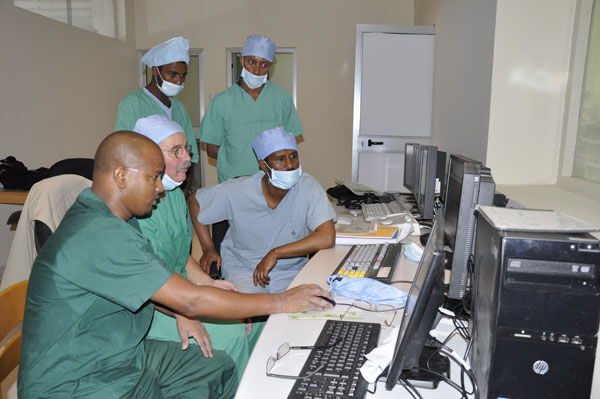
Second Etiopia-Witten interventional Workshop in Mekelle - Ethiopia Nov. 2018
The second interventional cardiology workshop on congenital heart defects in Mekelle - Ethiopia had been held in Mekelle - Ethiopia from October 29th to Nov. 1st 2018, organized by the German NGO Etiopia-Witten association.
This time the focus was on both, the balloon dilatation of pulmonary valve stenosis as well as closure of the patent ductus arteriosus (PDA*). It included again simulator training on a heart model and hands on work treating patients.
The workshop took place in the catheterization laboratory of the Department of Cardiology of Ayder Referral Hospital of Mekelle University. It was conducted by the pediatric interventional cardiologist Prof. Dr. Nikolaus Haas, Director of Department of Pediatric Cardiology and Pediatric Intensive Care Medical Hospital of the University of Munich Germany. Five patient had been successfully treated.
Two simulator models have been in use. They are 3-D models of the heart from silicone, printed by 3-D-Printer using a 3-D data set from adult human Cardiac CT. A stenotic pulmonary valve or a wide open ductus arteriosus was added. The models were developed by medical students of Munich University Cand. med. Alisa Thierij and Cand. med. Barbara Sophie Brunner under supervision from Prof. Nikolaus Haas.
The Ethiopian cardiologists Abraha Hailu Weldegerima MD, Hagazi Tesfay Haddush MD, the pediatrician Marta Yemane MD from Ayder Hospital Mekelle and the pediatric cardiologist Temesgen Tsega MD from St. Pauls Hospital Addis Abeba have trained by using the heart models before starting patient treatment.
Beside the extensive training on the simulator, for the fist time in Ayder Hospital three patients with pulmonary stenosis had been treated by balloon dilatation successfully. This in close cooperation with Prof. Haas and the Ethiopian interventionists. Because of the experience gained during the first workshop, the Ethiopian crew was able to perform two procedures to close the PDA independently and successfully.
The size of the PDA in One of the three scheduled patient was much too wide for the available closure devices. This patient has to be send for surgery.
Over all again this workshop was a great success for all. The heart models performed well and the cardiologists in the Ayder cath lab are now confident to offer soon these types of treatment to their patients.
The success of this workshop again was only possible thanks to the great and reliable support of the cath lab nurse team and the nurse anesthetist Alem Gebreyesus.
A third workshop is planned for the near future.
The financing of the expensive single use materials and the closure devices was taken over by Mekelle University.
* A PDA is characterized by the persistence of a normal fetal connection between the aorta and the pulmonary artery through which erroneously oxygenated (red) blood circulates through the lungs. A big PDA can cause serious negative consequences. In addition to early lung failure, severe, permanent damage to the lung tissue can develop. Also bacterial infections of the heart are possible.
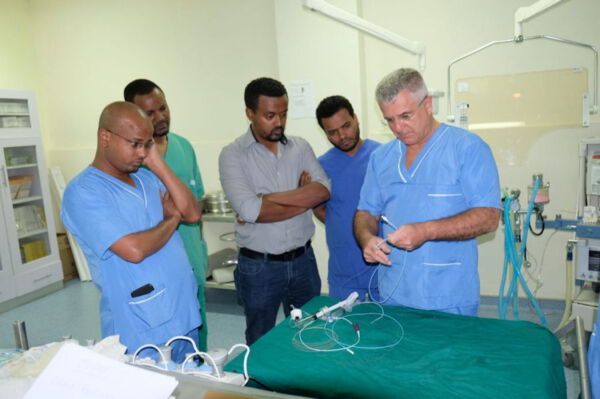
First Etiopia-Witten Workshop on PDA closure in Ayder Hospital July 2018 by Prof. Nikolaus Haas from Munich Germany
During a five-day workshop from July 23 to July 27, 2018 at the Ayder Referral Hospital of Mekelle University in Mekelle, the capital of the northern province of Ethiopia, 15 patients were treated in the cath lab with large, persistent ductus botalli (PDA) *. In 12 cases the closure was successfully performed by catheter-based procedure with the Nit-Occlud PDA-R system from PFM-Medical. In three cases, PDA's were larger than the available closure systems. These patients will be registered for surgery.
he workshop was organized by the association Etiopia-Witten from Germany and the cardiologists of the Ayder Hospital. He was conducted by the interventional pediatric cardiologist Prof. Dr. med. Nikolaus Haas, the director of the Department of Pediatric Cardiology and Pediatric Intensive Care Medicine of LMU Ludwigs Maximilian University, University of Munich Germany.
AIn the morning, simulator training was done in the Ayder Heart Catheter Laboratory on a silicone / iodine heart model with a PAD, developed by German medical students at the University of Munich. the model had been printed using a 3D printer. The simulator training was done with original but expired catheter materials. The patients enrolled were examined in advance clinically and echocardiographically. Over the next few days, Prof. Haas provided a step-by-step guide to measure the size of the duct by X-ray angiography and placement of the closure device in the PDA. At the end of the workshop, the most experienced Ayder cardiologists were able to successfully carry out the procedure independently.
The financing of the expensive single use materials and the closure devices was taken over by Mekelle University.
* A PDA is characterized by the persistence of a normal fetal connection between the aorta and the pulmonary artery through which erroneously oxygenated (red) blood circulates through the lungs. A big PDA can cause serious negative consequences. In addition to early lung failure, severe, permanent damage to the lung tissue can develop. Also bacterial infections of the heart are possible.
The End
Ongiong activities in the Ayder Cath lab 2015/16
Together with the Ethiopian Cardiologist Dr. Abraha Hailu Weldegerima Dr. Christian Leuner performed again a coronary angiography on an severely diseased patient with high grade left ventricular dysfunction and coronary heart disease. Dr. Christian Leuner was very happy, that a second coronary angiography was performed Dr. Abraha Hailu and the internist Dr. Samuel Berhane without his assistance at the cath table.
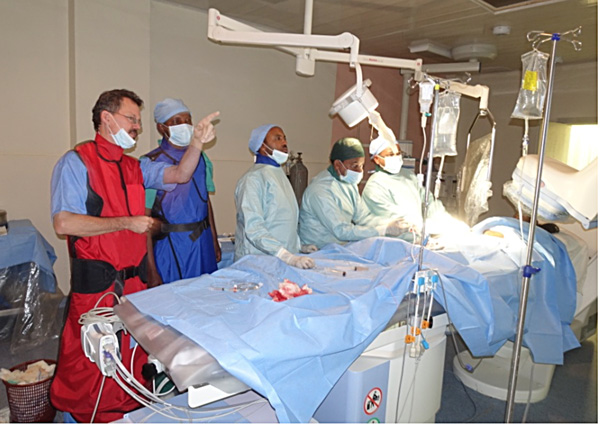
When the German cardiologist Dr. Gabriele Wehr from Stuttgart joined Dr. Leuner first time during his stay in Mekelle, she started immediately hands on training in the cath lab with Dr. Abraha.
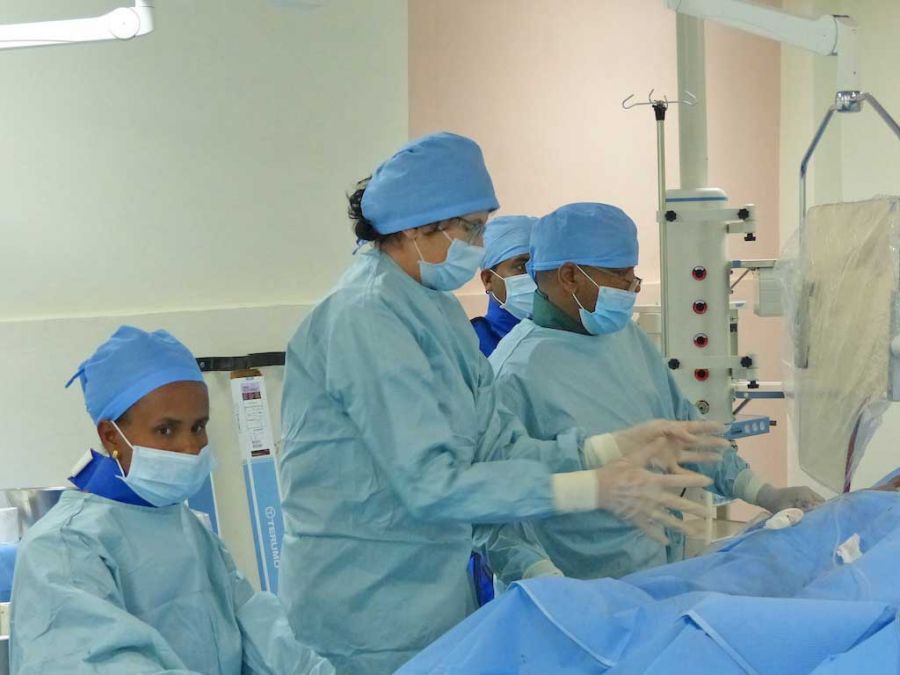
The first step to introduce the paediatric cardiologists to the cath lab was done. Together with Dr. Christian Leuner the in India educated paediatric cardiologist Dr. Temesgen Tsega a first two years old severe sick child was treated with a puncture of the pericardium.
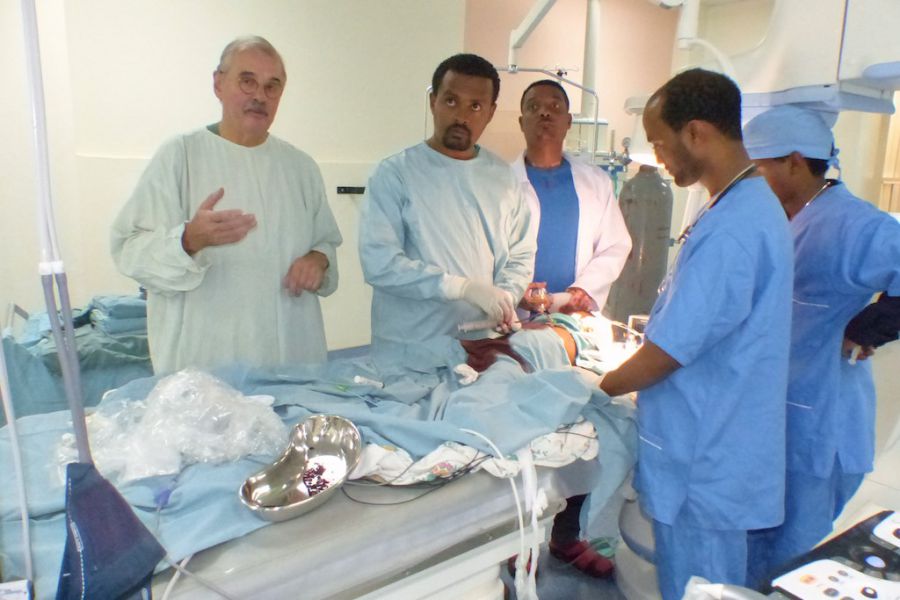
Now Dr. Christian Leuner is confident that his support for the installation and setup of the cath lab of Ayder Hospital and his teaching of the physicians and nurses since 2013 will is becoming successful, because in future interventional cardiology with increasing complexity can be performed continuously by the Ethiopian cardiologists in Ayder Hospital with and without foreign supporters.
Dr. Christian Leuner is still not content that because of the not yet installed adequate air conditioning of the cath lab unit only one procedure per day is possible. More adult and paediatric cardiologists will be sent via Ethiopia- to perform and teach in future more complex interventions to the local physicians, when the cath lab can be used on a full work day basis.
President from Tigrinya H.E. Mr. Abay Woldu visits Ayder Cath lab June 2ß16
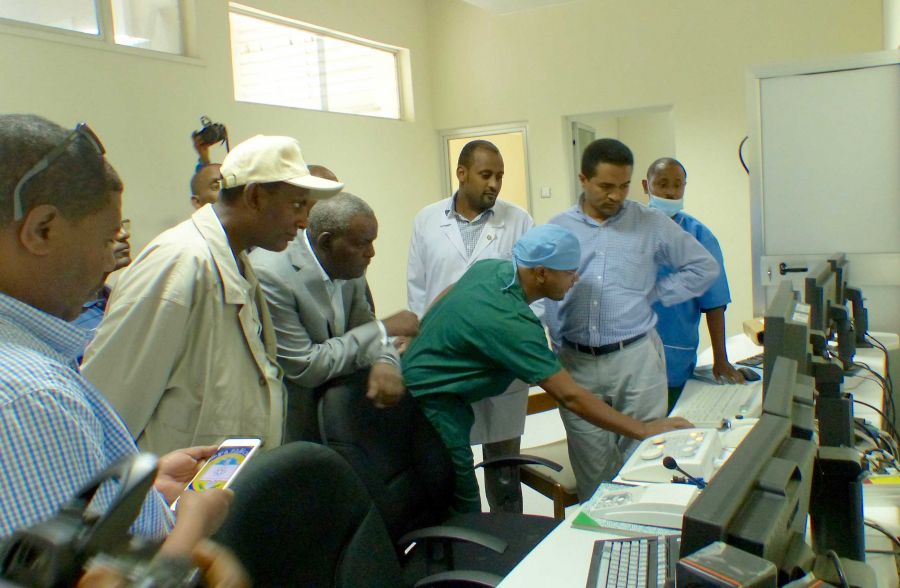
The Ayder cath lab is in 2016 the only modern and new place in an Ethiopian University Hospital. H.E. Mr. Abay Woldu, the President of Tigray (in the middle) is very interested in the modern technology place. The head of the cardiology department, the cardiologist Dr. Abraha Hailu demonstrates the possibilities of the system to the president during his visit in Ayder Hospital on July 7th 2016. With him Dr. Kindeya Gebrehiwot (left), Dr. Amanuel Haile (second from right), Dr. Loko Abraham (third from right).
The first heart catheteriziation in the new cath lab of Ayder hospital 2015
The first heart cathetriziation in the new cath lab of Ayder hospital was a right heart catheterization with pulmonary angiography in a patient with pulmonary hypertension of unknown origin.
The aim was beside the medical aspects to test the function of the many technical systems that have to cooperate in such a high tech system like a cath lab.
It was done by the in 2015 in Italy trained head of the Ayder cath lab, the Ethiopian cardiologist Dr. Abaha Hailu Waldegrima, and the German interventional cardiologist Dr. Christian Leuner from Bielefeld with the female Ethiopian cath lab nurse Takle Haile Michael at the cath lab table
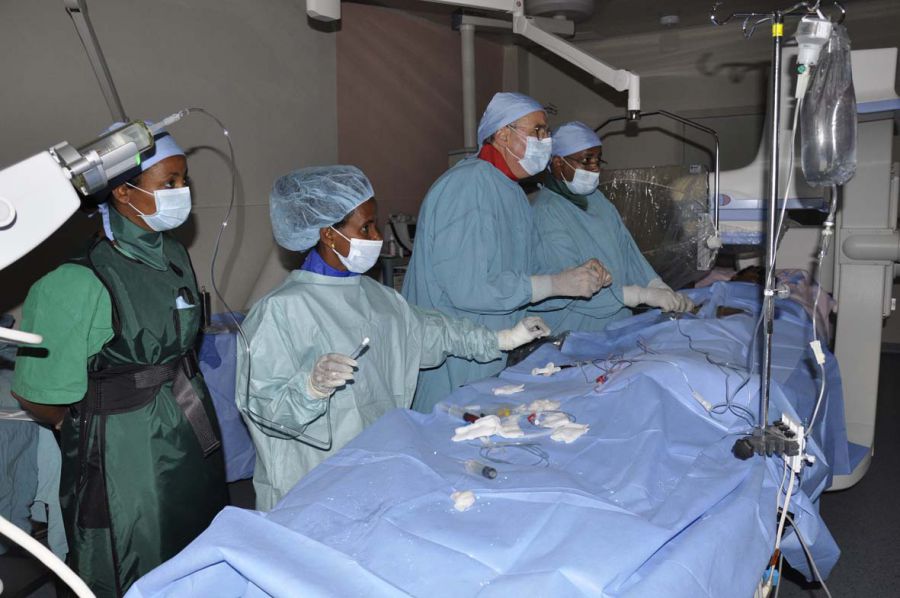
and the German cardiologist Dr. Norbert Scheffold from Memmingen with the Ethiopian cath lab nurse Selamawit Gebru in the control room.
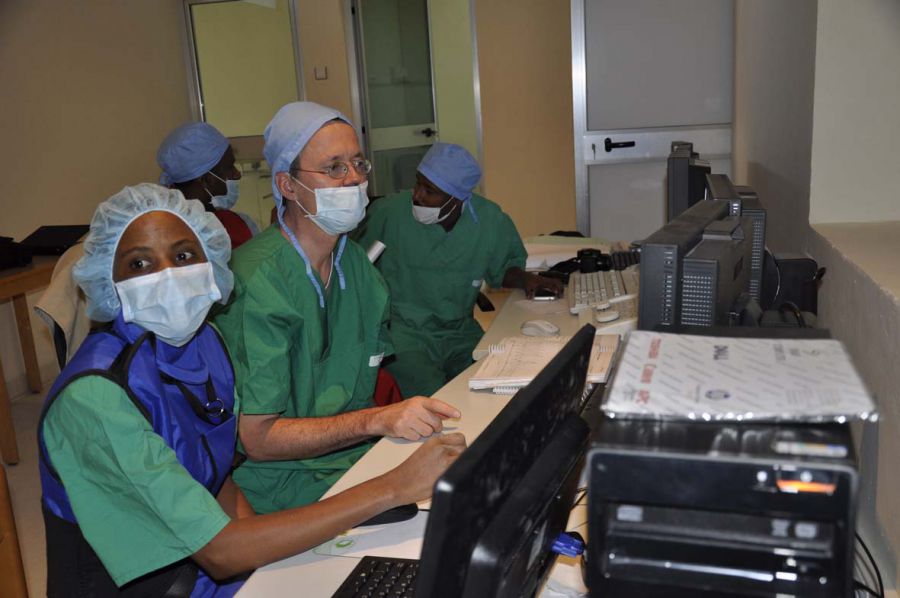
The procedure could be smoothely and without any major technical problems done.
The first cardiac catheterization laboratory (cath lab) in Ayder Referral Hospital of the University of Mekelle has been procured by the Ethiopian Ministry of Education in July, 2013. The aim was beside the medical aspects to test the function of the many technical systems that have to cooperate in such a high tech system like a cath lab.
Because no physicians with training in performing cardiac catheters where available for Ayder Hospital and so far no modern digitized cardiac catheterization laboratories have been established in Ethiopia, it was necessary to involve experienced cardiologists from abroad.
Etiopia Witten made it together with the Senior Expert Service possible that since 2013 the cardiologist and former senior physician from the Teaching Hospital, Klinikum Bielefeld – Germany in multiple multi-week stays in Ayder Hospital gave volunteer advise and monitoring for the planning and the structural and technical arrangement of the new cardiac catheterization laboratory.
Due to administrative barriers, restricted knowledge of suppliers, technicians, and craftsmen as well as the very limited access to technical equipment in the country many problems in Germany easy to be solved, were only lengthy or incomplete to master.
Even now the cath lab cannot be used to full because no functioning ventilation system could be installed until not yet and some important components of the cardiac catheter system are incomplete. A major obstacle is not yet mastered, the challenge how to finance the high costs of cardiac catheter materials for regular operation. They will not be covered foreign aid agencies. There must be found a way to treat even financially weak patients in cath lab. Because only by this there will be the necessary number of diseased patients coming, that give the possibilities to train the local medical staff in interventional cardiology in this academic training institution.
